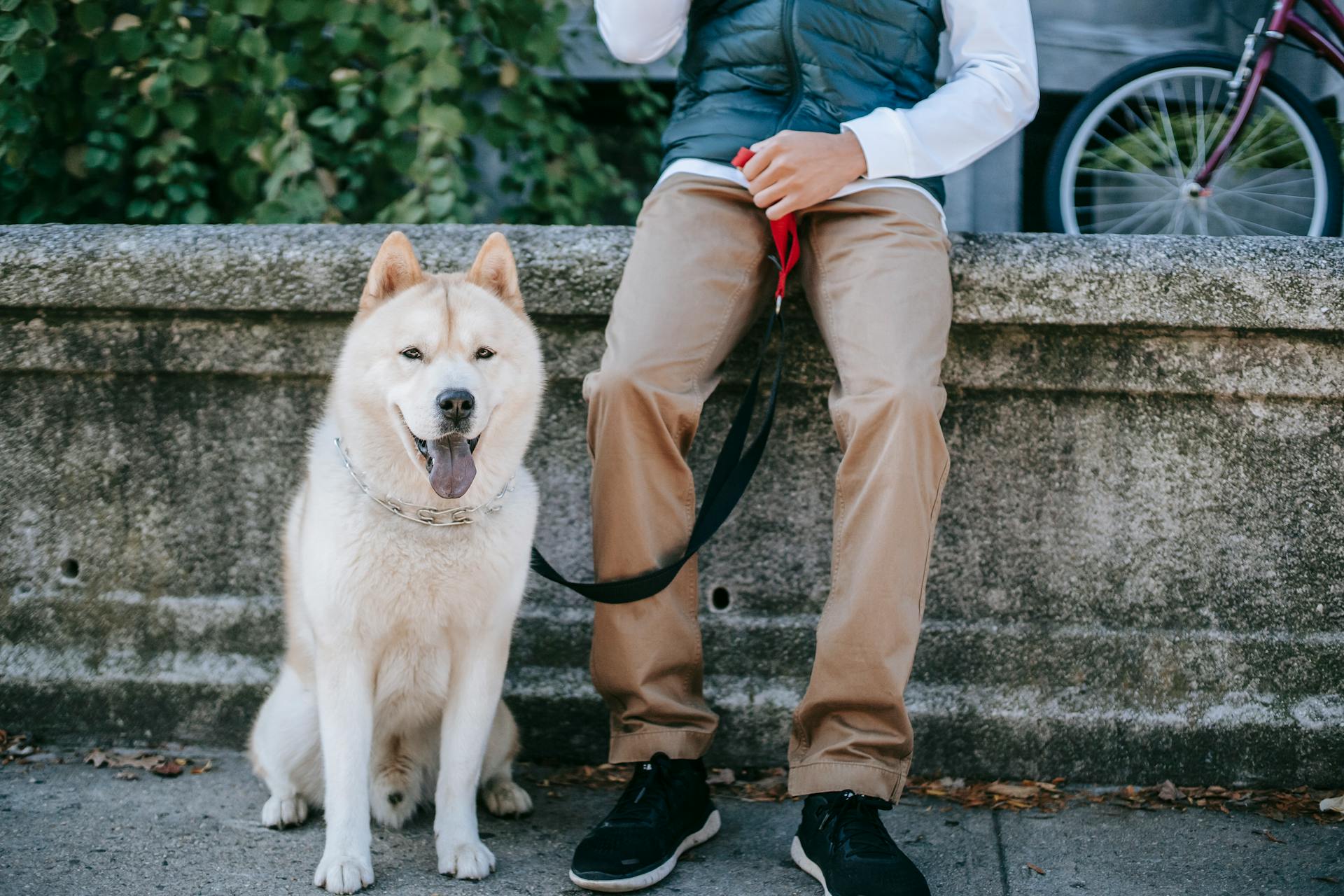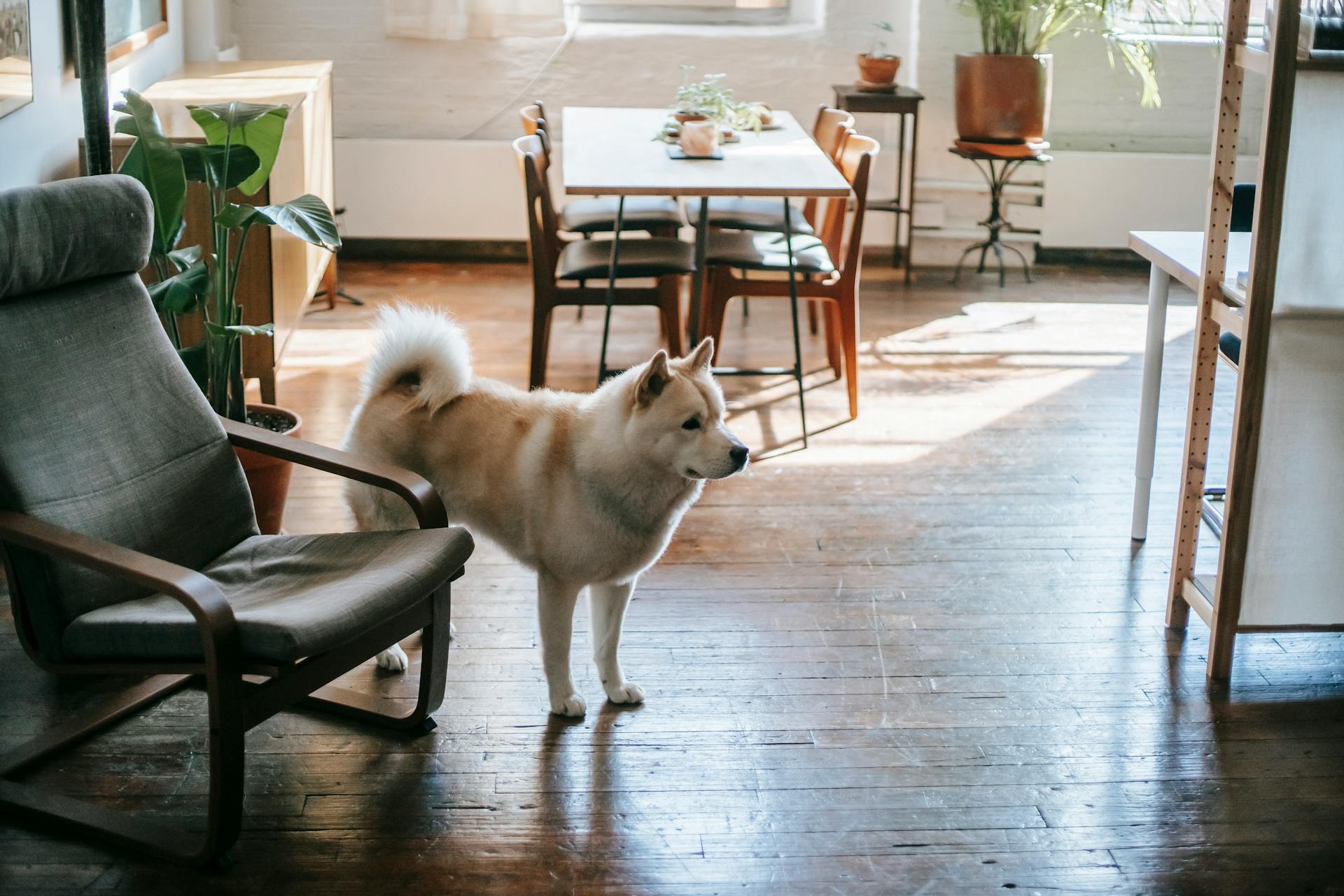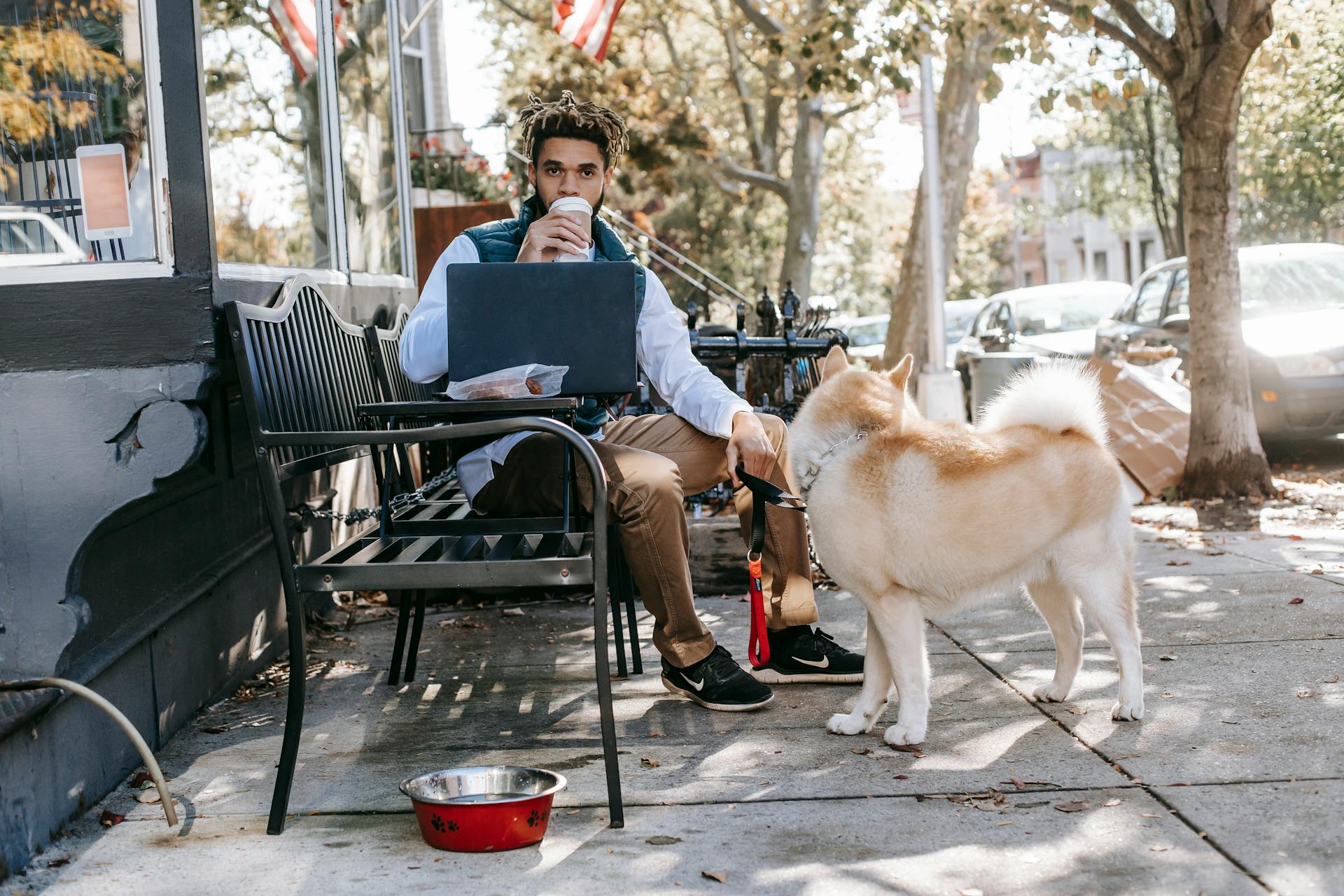
The American Japanese Akita is a loyal and loving companion that makes a great addition to many families. They originated from the Japanese Akita breed, which was first introduced to the United States in the 1920s.
These dogs are known for their distinctive appearance, with a thick double coat that sheds heavily. Regular grooming is essential to prevent matting and tangling.
Their friendly and outgoing personalities make them a great fit for families with children. However, they do require early socialization to ensure they get along with other pets and people.
American Japanese Akitas are generally healthy dogs, but they can be prone to certain health issues such as hip dysplasia and eye problems. Regular veterinary check-ups and a balanced diet can help prevent these issues.
Care and Maintenance
To care for an American Japanese Akita, you'll need to spend a lot of time with them - they thrive on attention and mental stimulation.
Akita parents must be patient, loving, and firm, as these dogs will follow you from room to room or cuddle up next to you with a good movie.
They're generally very clean dogs who enjoy taking care of themselves, but it's still essential to take them in for regular check-ups with your vet.
You'll need to stay close to your Akita dog when around strangers or other pets, as they can be unpredictable when bothered.
The cost of acquiring a purebred Akita can range from $1,000 to $2,500, depending on if it's from a reputable breeder and lineage.
Beyond the purchase price, maintenance costs include high-quality food, regular grooming, veterinary care, and training.
Due to their thick double coat types, American Akitas require regular brushing and occasional professional grooming.
Suggestion: Japanese Style Dog Grooming
Grooming and Health
The American Japanese Akita is a relatively long-lived breed, with a life expectancy of approximately 12 to 15 years. They have a small gene pool in the United States, making them more prone to genetic and other diseases.
Akitas are easy to groom, but they do shed a lot, especially during seasonal changes. They should be groomed a few times per week to manage shedding and support proper oil distribution in their fur.
Their thick double coat requires regular brushing, at least once a week, to keep it looking its best. During seasonal changes, they shed profusely and require more frequent grooming to get rid of the dead coat.
Here are some common health issues that can affect Akitas:
- Gastric dilatation-volvulus (bloat)
- Hip dysplasia
- Sebaceous adenitis (an autoimmune skin disease)
- Hypothyroidism (an underactive thyroid gland)
- Various eye problems, including canine cataracts and multifocal retinal dysplasia
Coat Color and Grooming
Akita coat colors can vary significantly, with 9 colors and 5 markings registered by the American Kennel Club. These colors can range from black to red, with various shades and combinations.
The American Akita often has a black mask, which is a distinctive feature of the breed. This mask can cover the eyes and mouth, and is a common sight on American Akitas.
Akitas are easy to groom, despite their thick coat. They are similar to cats in that they like to groom and maintain their appearance.
For more insights, see: American Bully Colors Names
You'll need to groom your Akita a few times per week to manage shedding and support oil distribution in their fur. This will help keep their coat looking its best.
Pinto-colored Akitas have a white background with large patches, which can cover their heads and more than one-third of their bodies. This unique coat pattern is a result of their genetic makeup.
Akitas shed heavily twice a year, which requires regular brushing to prevent matting and tangling. Brushing once a week is usually sufficient, but this can increase to daily during moulting periods.
Regular grooming is essential to keep your Akita's coat looking healthy and shiny. Brushing, bathing, and trimming are all crucial aspects of their grooming needs.
Their thick, short fur is self-cleaning, making grooming a manageable task. However, this doesn't mean they don't require regular attention to stay healthy and happy.
Consider reading: American Eskimo Grooming
Health Problems
The American Akita life expectancy is approximately 12 to 15 years, which is relatively long for a larger dog. They're a healthy breed, but their small gene pool in the United States makes them more prone to various genetic and other diseases.
Both Japanese and American Akitas have a similar lifespan, ranging from 10-13 years. They might be more prone to certain conditions due to their lack of activity.
Gastric dilatation-volvulus, also known as bloat, can occur when Akitas eat or drink too quickly, resulting in a medical emergency. This is a serious condition that requires immediate attention.
Hip dysplasia is a congenital condition that affects the hip joint, leading to arthritis. It's a common health issue in Akitas.
Autoimmune diseases, such as sebaceous adenitis, can cause skin problems and hair loss. This condition affects the skin glands, making them sore and inflamed.
Akitas can also suffer from hypothyroidism, an underactive thyroid gland that leads to skin, weight, and energy issues. Regular veterinary checkups can help monitor and manage this condition.
Various eye problems, including inherited conditions like canine cataracts and multifocal retinal dysplasia, can affect Akitas. It's essential to have regular eye exams to detect any potential issues early on.
To keep your Akita healthy, it's crucial to monitor their diet and arrange regular veterinarian checkups. This can help prevent or manage health issues like bloat, hip dysplasia, and autoimmune diseases.
Here are some common Akita health problems:
- Gastric dilatation-volvulus (bloat)
- Hip dysplasia
- Sebaceous adenitis (autoimmune skin disease)
- Hypothyroidism (underactive thyroid gland)
- Various eye problems (canine cataracts, multifocal retinal dysplasia, etc.)
Training and Socialization
As an American Japanese Akita owner, you'll want to prioritize training and socialization to help your pup grow into a well-behaved and loyal companion.
You must socialize your Akita puppy from a very young age to help them grow into a more socialized dog. This means introducing them to other animals, children, and strangers in a controlled environment.
Daily walks are a great time to socialize your Akita puppy, especially when they're more comfortable around friends. You can start by introducing them to one dog at a time in a controlled environment, as they may act out when meeting many dogs at once.
Akitas are notorious for being independent and stubborn, making them tough to train. They require a strict, disciplinarian owner who is patient and consistent.
Obedience classes may be beneficial for new owners or those who want extra training help, especially for Akitas that are prone to becoming problematic when not trained properly.
Related reading: Pic of an Akita Dog
Using a dog training collar can help your Akita learn quickly and produce a well-behaved, obedient dog. These collars can be a valuable tool in your training arsenal.
Loving but consistent training and comprehensive socialization as a puppy are of huge importance for an American Japanese Akita. This will help them develop good lead behavior and reduce the risk of them taking you for a walk instead of the other way around.
If you're considering purchasing an Akita, you should have sufficient experience in training and rearing dogs to help you navigate their unique personality and needs.
Temperament and Personality
The American Japanese Akita is a breed known for its courageous and dignified personality. They are fiercely loyal to their owners and make excellent watchdogs due to their protective nature.
Akitas are naturally suspicious of strangers, which can be a challenge when introducing them to new people. They may become vocal and alert you to potential threats, but their bark is often more of a murmur or moan.
These dogs are highly territorial and will defend their family and home if necessary. They have a strong will and can be independent, making training a challenge, but with patience and consistency, they can learn to behave.
Akitas are not a very talkative breed, but when they do bark, it's often to alert you to something important. They're also not big fans of playing fetch or jumping through hoops, preferring more meaningful activities.
Their intelligence and dominant tendencies can make training difficult, but with the right approach, they can learn to cooperate. In fact, they're highly capable of learning and can even learn to behave around children with proper socialization and training.
Akitas are often possessive and jealous, especially when it comes to their food and toys. They may even become selfish with their owners' attention, which can be a challenge for some owners.
Despite these challenges, Akitas make loyal and loving companions for those who are willing to put in the time and effort to train and socialize them. With patience and consistency, they can thrive as a beloved family pet.
A fresh viewpoint: Are Akitas Good with Kids
Size and Weight
The American Akita is a big dog, and I mean big! Fully-grown males can weigh up to 130 pounds.
The size difference between males and females is noticeable, with females typically weighing between 70 to 100 pounds.
Males reach heights between 26 and 28 inches tall, while females stand at 24 to 26 inches at the withers.
The Japanese Akita Inu is often confused with the American Akita due to their similar size, but they are actually two different breeds with many differences.
The Japanese Akita is generally a bit smaller, with an average height of 25-27 inches, and weighs around 70-100 lbs for males.
Females of the Japanese Akita typically weigh around 50-70 lbs.
Expand your knowledge: Akita Dog Weight
Aggression and Friendliness
The American Japanese Akita is a breed that's not afraid to speak its mind. They're bold, alert, and headstrong, which can sometimes lead to aggression towards other dogs, especially those of the same sex.
Socialization is key when it comes to Akitas. If you adopt two puppies together and socialize them well, they'll be more likely to get along. However, it's usually recommended that Akitas live in single-dog households to prevent conflicts.
Akitas are loyal and loving to their family, but they can be wary of strangers. With proper socialization, they'll be friendly and affectionate towards their loved ones.
On a similar theme: Types of Akitas
Are They Aggressive?
The American Akita is a bold, alert, and headstrong dog. This loyal breed loves its family and those close to them, but can be wary of strangers.
They tend to be more aggressive towards other dogs, especially those of the same sex. Unless you adopt puppies together and socialize them with one another as they grow up, it's usually recommended that Akitas live in single-dog households.
Can They Be Friendly?
Akitas are generally friendly and affectionate toward their family and friends.
Socialization from a young age can make a big difference in their behavior, as they're likely to be friendlier if they're socialized well.
They were originally bred to be hunting dogs, and as a result, they tend to work hard to maintain their status as "top dog" in their household.
This can sometimes make them intolerant of other animals, but with proper training and socialization, they can learn to get along with others.
Living with an Akita
Living with an Akita can be a wonderful experience, provided you're willing to give them the daily exercise they need to stay happy and healthy.
Akitas are surprisingly adaptable to small homes, as long as they get enough physical activity.
They're relatively silent dogs, which is great news for city dwellers or those who live in apartments.
Akitas love to nap for hours on end, so be prepared for some serious cuddle time.
These dogs are also very clean and easy to housebreak, making them a breeze to care for.
Their affection and loyalty are just a few reasons why Akitas are such popular pets.
Rescue and Ownership
If you're ready to commit to adopting an American Japanese Akita, rescue groups are a great place to start. You can find reputable organizations in various locations, such as California, New York, and Northern California.
One option is to check out Namaste American Akita, located in California, or TikiHut Akita Rescue Association, which serves Northern California. These organizations can help you bring home your next best friend.
For more insights, see: Japanese Chin Dogs for Adoption
Rescue Groups
If you're considering bringing a new furry friend into your life, there are many wonderful rescue groups to explore.
If you're ready to commit, I recommend checking out some of the organizations listed below. They can help you bring home your next best friend.
These groups are dedicated to finding forever homes for Akitas in need. For example, Namaste American Akita is located in California, while Big East Akita Rescue serves New York, New Jersey, and Pennsylvania.
Other notable groups include TikiHut Akita Rescue Association, which covers Northern California, and Midwest Akita Rescue Society, which serves a large area including Illinois, Indiana, Iowa, Michigan, and more.
Here are some specific rescue groups to consider:
- Namaste American Akita — located in California.
- Big East Akita Rescue — located in New York, New Jersey, and Pennsylvania.
- TikiHut Akita Rescue Association — located in Northern California.
- Midwest Akita Rescue Society — Serves Illinois, Indiana, Iowa, Michigan, Minnesota, Missouri, Ohio, Wisconsin, and parts of Kansas and Kentucky.
- Rakki-Inu Akita Rescue — Serves North and South Carolina and Virginia.
Can You Own a Dog?
Owning a dog requires a significant commitment to exercise and training, as seen with the Akita breed that needs two quick trips around the block or more to stay fit.
Some dogs are more suitable for dog sports than others, like the American Akita Inu which is proud and independent and has no patience for little mobility games.
You'll need to consider the costs of owning a dog, with the American Akita Inu costing between £800 and £1,300.
You might be surprised by the demands of owning a dog, like the need for regular grooming and diet adjustments.
Ultimately, owning a dog is a big responsibility that requires careful consideration of your lifestyle and ability to provide the necessary care.
Frequently Asked Questions
What's the difference between a Japanese Akita and an American Akita?
Key differences between Japanese and American Akitas lie in their size, with American Akitas generally larger, and weight, with American males weighing up to 30 lbs more than their Japanese counterparts
What are the disadvantages of American Akitas?
American Akitas can be high-maintenance pets due to their excessive shedding, need for constant entertainment, and potential health risks. They also require experienced owners who can manage their strong prey drive and potential aggression issues.
Featured Images: pexels.com


